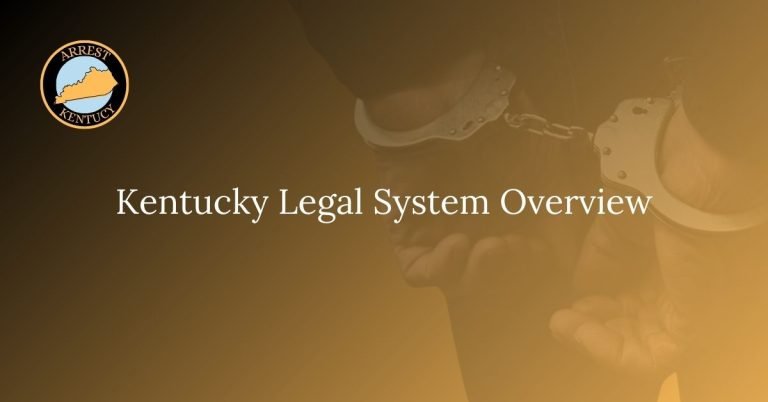Insight into Kentucky’s Criminal Justice System

Kentucky’s criminal justice system is a multifaceted network designed to uphold the law and ensure public safety throughout the state. This intricate system integrates various components, including law enforcement agencies, judicial institutions, and correctional facilities, all working together to maintain justice and order. Each part of the system plays a crucial role, from investigating crimes and prosecuting offenders to managing correctional facilities and offering rehabilitation programs.
Understanding how these elements interact provides valuable insight into the operational dynamics of Kentucky’s justice system. This comprehensive view helps illustrate the system’s challenges, its ongoing efforts to improve, and the critical role it plays in both enforcing laws and rehabilitating individuals to reintegrate into society.
Kentucky’s Criminal Justice Framework
The criminal justice framework in Kentucky involves a coordinated effort among various entities dedicated to upholding the law and ensuring the safety of its residents. This network includes local police departments that manage law enforcement within city limits, county sheriffs who handle duties in rural and unincorporated areas, and state-level agencies like the Kentucky State Police that provide specialized services and jurisdiction across the state. Each of these agencies plays a crucial role in investigating crimes, apprehending suspects, and maintaining public order. Together, they form a comprehensive system that works to ensure that justice is served and the rule of law is upheld.
Law Enforcement Overview
In Kentucky, law enforcement is a multi-tiered operation involving local, county, and state-level agencies. Local police departments are responsible for handling incidents and crimes within their respective municipalities. They respond to emergency calls, conduct investigations, and work closely with community members to address local issues. County sheriffs oversee law enforcement duties in areas that do not have municipal police forces, and they also manage county jails where individuals awaiting trial or serving short sentences are held. At the state level, the Kentucky State Police provide broader jurisdiction and specialized investigative services that support local and county efforts. This structure ensures a comprehensive approach to maintaining law and order across different levels of governance.
Judicial System Structure
Kentucky’s judicial system is organized into a hierarchical structure designed to address various types of legal matters. At the base level, district courts handle preliminary issues, minor criminal offenses, and small claims cases. These courts are often the first point of contact for individuals involved in legal disputes or criminal charges. More serious cases, including major criminal offenses and complex civil matters, are managed by circuit courts. These courts have the authority to handle cases beyond the scope of district courts and often deal with more substantial legal issues. The appellate courts, which include the Court of Appeals and the Supreme Court, review decisions made by lower courts to ensure that legal procedures and principles were correctly applied, providing an avenue for correcting errors and ensuring justice.
Correctional and Rehabilitation Efforts
The correctional system in Kentucky is designed to manage individuals who have been convicted of crimes, with facilities including prisons and jails. Prisons are used for individuals serving longer sentences, while jails accommodate those awaiting trial or serving shorter terms. To address issues of overcrowding and to support the rehabilitation of offenders, Kentucky also implements probation and parole programs. These programs allow eligible individuals to serve part of their sentences under supervision in the community, facilitating their reintegration into society. Additionally, the state offers various rehabilitation initiatives and educational programs aimed at reducing recidivism and preparing individuals for a successful return to the community, thus promoting long-term public safety and personal reform.
Systemic Challenges and Reforms
Kentucky’s criminal justice system faces several challenges that impact its effectiveness and fairness. Overcrowded correctional facilities strain resources and affect the well-being of inmates, while racial disparities within the system highlight the need for equity-focused reforms. Addressing these issues requires continuous efforts to improve conditions and implement fair practices. Additionally, there is ongoing debate about sentencing practices and the efficacy of rehabilitation programs, prompting policymakers to explore and adopt evidence-based alternatives. These challenges underscore the importance of reform and innovation in the criminal justice system to enhance its ability to deliver justice effectively and equitably.
Frequently Asked Questions
Explore our FAQs for a deeper understanding of the complexities and nuances within Kentucky’s criminal justice system.
How are juvenile offenders managed?
Kentucky manages juvenile offenders through a specialized juvenile justice system designed to focus on rehabilitation rather than punitive measures. The system aims to address the unique needs of young offenders by offering various programs and support services. These include diversion programs to keep juveniles out of the formal justice system, counseling to address behavioral issues, and educational opportunities to promote positive development. The goal is to provide guidance and support that will help juveniles reintegrate into society as responsible and productive individuals, reducing the likelihood of future offenses.
What programs reduce recidivism?
Kentucky employs several programs aimed at reducing recidivism among offenders. These include vocational training programs that help individuals acquire job skills, substance abuse treatment to address addiction issues, and mental health services to support emotional well-being. The state also emphasizes community-based alternatives to incarceration, which allow individuals to remain connected with their families and communities while undergoing rehabilitation. These initiatives are designed to address the underlying factors contributing to criminal behavior and support successful reintegration into society, ultimately reducing the likelihood of reoffending.
What are the main components?
The primary components of Kentucky’s criminal justice system include law enforcement agencies, the judicial system, prosecutors, defense attorneys, probation and parole offices, and correctional facilities. Law enforcement agencies are responsible for investigating and addressing criminal activities. The judicial system, consisting of various courts, handles legal proceedings and adjudicates cases. Prosecutors and defense attorneys represent the interests of the state and the accused, respectively. Probation and parole offices supervise individuals who are serving sentences outside of incarceration, while correctional facilities manage those who are imprisoned. Each component plays a vital role in the administration of justice and public safety.
What does the Kentucky Department of Corrections do?
The Kentucky Department of Corrections oversees the state’s prison system, managing the incarceration of individuals convicted of felonies. Its responsibilities include ensuring the safety and security of correctional facilities, as well as providing rehabilitation programs aimed at helping inmates reintegrate into society. The department’s efforts are focused on maintaining secure environments within prisons and offering services that support inmates’ successful transition back into the community, such as educational programs, vocational training, and substance abuse treatment.
Are there specialized courts?
Kentucky has several specialized courts designed to address the specific needs of certain populations. These include drug courts, which focus on individuals with substance abuse issues; mental health courts, which cater to those with mental health challenges; and veterans’ courts, which assist military veterans dealing with legal issues related to their service. These specialized courts offer tailored approaches to handling cases, aiming to provide appropriate support and treatment that address the underlying issues contributing to criminal behavior.
What happens during arraignment?
Arraignment is the initial court appearance where a defendant is formally charged with a crime and asked to enter a plea. During this process, the defendant is informed of the charges against them and their rights. If the defendant cannot afford an attorney, the court will appoint one to ensure they have legal representation. This stage is crucial as it sets the groundwork for the legal proceedings that follow, including the opportunity for the defendant to challenge the charges and prepare for trial.
What are the penalties for felonies?
In Kentucky, penalties for felony convictions can vary widely depending on the nature of the crime and the defendant’s prior criminal history. Potential penalties include imprisonment, which can range from several years to life sentences; fines, which are financial penalties imposed by the court; probation, which involves supervised release under specific conditions; community service, requiring offenders to perform work for the benefit of the community; and restitution, which involves compensating victims for their losses. The severity of the penalty is determined based on the seriousness of the offense and the individual circumstances of the case.





